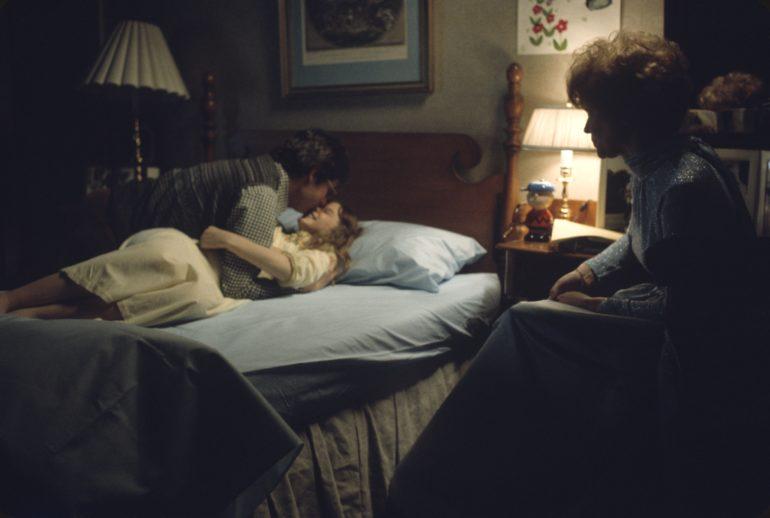Film Review: ‘Leap of Faith: William Friedkin on The Exorcist’
By Guy Lodge
LOS ANGELES (Variety.com) – 46 years on from its release, “The Exorcist” is not exactly a film that wants for analysis; it’s also not a film people are likely to stop analyzing any time soon. William Friedkin’s horror masterclass is, well, just that: one of its genre’s most irresistibly teachable works, with a clear, clean command of form and theme that lends itself to limitless scholarly scrutiny and interpretation. Alexandre O. Philippe’s simply styled documentary “Leap of Faith: on ‘The Exorcist’” has a lot more of that to offer;Essentially a single interview with Friedkin interspersed with repeatedly revisited clips, “Leap of Faith” chiefly examines — per its title — the film’s spiritual allusions and illusions, distinguishing it from just any old making-of doc.
Not that you’d expect anything quite so standard from Philippe, the Swiss filmmaker who has carved out his own auteurist niche in the realm of cinema-studies documentary, examining his chosen subjects with oblique, obsessive intricacy. “Leap of Faith” lacks the conceptual specificity and rigor of 2017’s “78/52,” his ingenious deconstruction of the “Psycho” shower scene, or the recent “Memory: The Origins of Alien,” with its catholic, lateral-thinking cultural framework. Closer to DVD-extra territory than either of those, Philippe’s latest makes up for its cinematic limitations with the sheer charismatic volubility of Friedkin’s presence. Having premiered in Venice’s Classics strand, it can expect a healthy festival run and specialist distribution, without quite crossing into midnight-movie territory the way “78/52” did.
“Films are about the mystery of fate or the mystery of faith,” says Friedkin early on, positing “The Exorcist” as one of the latter. It’s arguably a neater soundbite than it is a meaningful one, since many films (Friedkin’s among them) can surely claim to be about both — though one of the chief pleasures of “Leap of Faith” is that we’re never quite sure how seriously the 84-year-old filmmaker is taking himself at any given point. He’s spry company either way, committed to building a playful mythology around his solemn tale of Satanic possession, to the point of suggesting its very production was shaped by uncanny serendipity: “Forces beyond me brought things to the film, like offerings,” he says, before detailing various by-chance quirks and complications in the process of scripting, casting, shooting and scoring the film.
These are not astonishing anecdotes, but they are, by and large, entertaining ones: Friedkin is as deft a storyteller on camera as he is behind it. Cinema geeks will already know a number of them: how celebrated character actress Mercedes McCambridge gargled raw eggs and apple mush to record the haunting voice of invasive demon Pazuzu, how Friedkin slapped real-life priest Father William O’Malley across the face without warning to get the desired emotional reaction on camera, and so on. (The film was presumably made too late to consider recent charges of child sexual abuse made against O’Malley.)
Less expected is Friedkin’s account of how desperate “Exorcist” author and screenwriter William Peter Blatty was — to the point of offering to relinquish his profits from the production — to play the role of the tormented Father Damien Karras, which was initially earmarked for Stacy Keach before eventually going to playwright Jason Miller. The late Blatty, of course, isn’t on hand to verify this, nor to defend himself from Friedkin’s assertion that the author’s initial script was a “travesty” before the director pulled it into shape. Such gossipy nuggets are examples of the superior forces that Friedkin alleges were at play, though most would agree that kismet, happenstance and plain old trial-and-error play a role behind the scenes of any movie; nobody is going to come away from “Leap of Faith” believing that “The Exorcist” was itself a possessed production.
Philippe, however, is content to let Friedkin impishly write his own legend, leaving the audience to infer what they will about his creative process and personality from his patter. That this is Friedkin’s own idiosyncratic account of his most enduring work is indeed the primary selling point of “Leap of Faith,” though it’s hard not to wonder how differently the film’s other living alumni — not least its female leads, Ellen Burstyn and Linda Blair — might remember things.
Yet the film’s single talking-head approach pays off rather touchingly when it veers from making-of minutiae to Friedkin’s more considered, unconfident appraisal of the film’s relationship to faith. “I wouldn’t be a filmmaker if I was a skeptic,” he says, having already stated that Dreyer’s austere, ambiguous religious drama “Ordet” was his principal inspiration behind “The Exorcist”; on the other hand, he believes that the limits of his faith obstructed his own understanding of the story he was telling. “I can’t defend that scene,” he says of the film’s ending, in which the newly possessed Father Karras commits suicide to kill the spirit within him. Does he genuinely not believe it? Or is he once more teasing us, stoking and enhancing his film’s rich, lurid mythos? Philippe’s modest but puckish documentary keeps us guessing.

